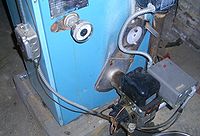User:Steve10345/Babbington Burner

A Babington Atomizer is a device which atomizes viscous flammable liquids. The oil is atomized in to a fine spray. In a Burner this spray is ignited to produce a flame
atomization
[edit]The Liquid to be atomized flows over a tiny 0.01" orifice fed with compressed air. This arrangement is referred to as babington atomiser/nozzle after its inventor. As the liquid just flows over the nozzle , it can use a low pressure oil pump. Unlike many other atomization systems, there is no small orifice for the liquid that to be atomized to pass through, so if the pump can handle it, the liquid may even contain lumps, such as scraps of food. Because it is only compressed air that passes through the orifice, such nozzles do no--89.168.112.133 (talk) 14:25, 18 September 2012 (UTC)t suffer much from erosion or clogging.
Oil pump
[edit]
A fuel oil pump consists of two parts:
- Gear pump type
In a babington the liquid isn't delivered at any great pressure, and so the pump need not generate much pressure. This type of pump is a simple and therefore cheap pump consisting of one or more radical pairs of gears and with a very small space between the gears and the pump casing. Gear pumps are used frequently in oil burners because of their simplicity, stability and low price.
Ignitors
[edit]Some oil burners use glow bars which operate much like the glow plugs of a diesel engine
Many use high voltage generated by a voltage-step up transformer and use a spark plug to initiate ignition
Photocell
[edit]
A light sensitive resistor (LDR) detects the flame. The LDR (or Light Dependent Resistor) resistor is an electrical resistor whose value changes by the amount of light that it present. The resistance value of an LDR becomes smaller, as the LDR is more and more exposed. The material is usually cadmium sulfide, the dark resistance is 1.10 MΩ resistor while the light resistance is about 75-300 Ω. LDR's have a relatively slow response time.
Order for starting an oil burner
[edit]- Purge the burner/boiler with air
- Atomise the fuel oil
- Deflagrate the mistified fuel oil with a high voltage between two electrodes
- Check with flame detection whether the fuel oil fires up
If the burning does not catch on, the burner will go into alarm and must be then be manually reset.
See also
[edit]- Heating oil
- Boiler
- Portable stove
- Kerosene lamp
- LO-NOx burner
- Rayburn Range
- Passive house
- Central heating
- Heater
- Dilution factor
- Jet Fuel Oil
- babington Oil Burner
References
[edit]{{DEFAULTSORT:Oil Burner}} [[Category:Lamps]] [[Category:Fireplaces]] [[Category:Cooking appliances]] [http://www.homebrewpower.co.uk/html-shop-products/babington-burner-nozzles-for-sale.html British built Babington Burner Nozzles] [[de:Brenner (Gerät)]] [[nl:Brander (energie)]] [[fi:Öljypoltin]] [[sv:Oljebrännare]]
